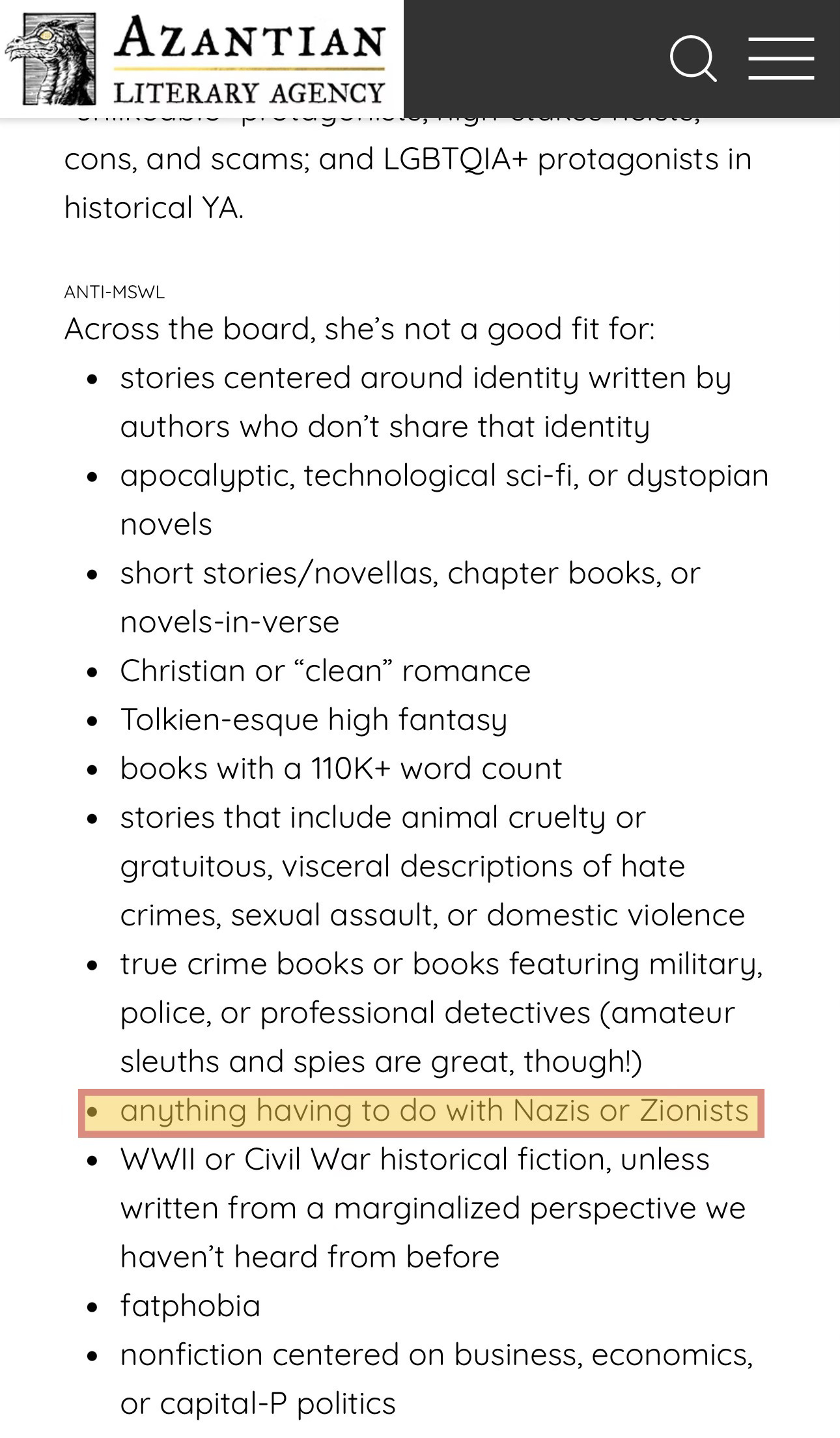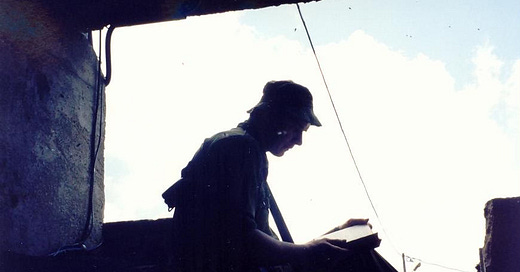The Book No One Would Touch
Over a hundred rejections. A finished novel about the Israeli army. The far side of the moon — what the world refuses to say
I hadn’t planned to share this project publicly just yet. I’d hoped to one day surprise everyone with the news that a novel I’d been carrying in my mind for the past ten years — based on real events and set in the Israeli army of the late 1990s — was finally finished. I completed it last fall, after two years of intensive work.
Over the past eight months, I’ve queried more than 100 literary agents in the US and over 50 in the UK. Not one expressed interest.
Then I came across this:
“I am NOT a good fit for:
• anything having to do with Nazis, Zionists, or terrorists.”
This is taken directly from a literary agent’s official profile.
After that, things started to fall into place.

My novel is upmarket military historical fiction. It offers a detailed, realistic look at the training of new recruits in one of the most capable IDF units — the challenges they face and how 18-year-old boys deal with them. The main character goes through every stage of becoming a soldier, transforming along the way and reevaluating everything he thought he knew.
Although military life is central to the novel, at its core this is a story about duty, honor, brotherhood, love, patriotism, and a deep emotional connection to Israel, shaped by memory, sacrifice, and identity.
As far as I know, there’s no other novel that explores the inner world of the IDF with this level of depth.
I didn’t rely only on friends and family. My beta readers are people from different countries, professions, and backgrounds. They praised the early chapters and are convinced the rejections I’ve received aren’t about quality — but most likely about the book’s theme and content. They’re eagerly waiting for the novel, whose fate is still uncertain.
After finishing the novel, I spoke with Mosab Hassan Yousef. He congratulated me, but warned that even with name recognition and past bestsellers, the road would be difficult — most publishers today are simply unwilling to take risks.
At the time, I still held onto my illusions. I thought it would be different. I had just started querying agents and was full of hope.
Now I see how right he was.
I didn’t rely only on friends and family. My beta readers are people from different countries, professions, and backgrounds. They praised the early chapters and are convinced the rejections I’ve received aren’t about quality — but most likely about the book’s theme and content. They’re eagerly waiting for the novel, whose fate is still uncertain.
After finishing the novel, I spoke with Mosab Hassan Yousef. He congratulated me, but warned that even with name recognition and past bestsellers, the road would be difficult — most publishers today are simply unwilling to take risks.
At the time, I still held onto my illusions. I thought it would be different. I had just started querying agents and was full of hope.
Now I see how right he was.
To give you some context: most agents make their decision based on the first 5–10 pages of a manuscript. Occasionally they’ll ask for one full chapter, very rarely two. Here are excerpts from a few replies I received — no names, just to illustrate the tone:
“While this appears to be a strong project, I’m afraid it doesn’t strike me as a likely fit with me and my particular editorial contacts.”
“You have an interesting story to tell and there’s a lot to like about your approach.”
“While this is definitely the kind of project I am interested in, ultimately I wasn’t as taken with your manuscript as I need to be…”
“I am not currently active as an agent working with this type of material… As a Zionist I thank you for your service.”
And here’s one reply where the reason is stated almost explicitly:
“Of course it’s timely and I’m not sure there’s ever been a moment when the IDF has been more center stage.
Given the current climate in the publishing world, I am not confident I would be able to secure a trade publisher for this book…”
This response reflected what Mosab Hassan Yousef had warned me about: publishers, and it seems many literary agents too, simply don’t want to take on books that deal with uncomfortable topics.
And now we come to one of the key points. I always research an agent’s preferences before querying them — to see if they represent my genre, what kind of work they’re looking for, and whether my novel might be a fit. I never submit unless I believe the agent is open to my type of project.
So I was stunned to come across this line in the ANTI-MSWL of Larissa Melo Pienkowski, an agent at Azantian Literary Agency, listed on Manuscript Wish List:
“I am NOT a good fit for:
• anything having to do with Nazis, Zionists, or terrorists.”
https://www.manuscriptwishlist.com/mswl-post/larissa-melo-pienkowski/
And on her profile on the official agency website:
“Across the board, she’s not a good fit for:
• anything having to do with Nazis or Zionists.”
https://www.azantianlitagency.com/about-us/larissa-melo-pienkowski

It would be one thing if this were an isolated case. But another agent at the same agency, Thais Afonso, has similar language in her public profile:
The ANTI-MSWL of Thais Afonso, an agent at Azantian Literary Agency, as listed on the agency’s official website:
“In all genres, she’s not a good fit for any sort of positive spin on war, Monarchy, colonization, or genocide. She will not represent books with Zionist and imperialist propaganda, copaganda, or racist, queerphobic, Islamophobic, and anti-semitic tropes.”
“She’s also, in both age categories and across all genres, committed to supporting Palestinian authors, whenever they are ready and able to share their stories—she’s always open to queries for Palestinian authors.”

As listed on Manuscript Wish List:
“In all genres, I’m not a good fit for any sort of positive spin on war, Monarchy, colonization, or genocide. She will not represent books with Zionist and imperialist propaganda, copaganda, or racist, queerphobic, transphobic, islamophobic, and antisemitic tropes.”
“Apparently, people still write N*azi romances—I will never consider those. Please, do not query those to me. Same with colonizer/colonized, Israeli/Palestinian romance, and all iterations where genocide gets diminished for the sake of romance.”

And it doesn’t end there. A third agent at the same agency, Shelly Romero, states the following in her public profile on the agency website:
The ANTI-MSWL of Shelly Romero, an agent at Azantian Literary Agency, as listed on the agency’s official website:
“Please don’t send me:
• stories featuring Nazis, Zionists, ICE, republican government employees, cops, military etc.”

I find myself wondering how the above preference statements from these three agents align with the Code of Ethics of the Association of American Literary Agents (AALA):
“They pledge not to abuse (sexually, verbally, physically or otherwise), discriminate against, harass, mislead, deceive, dupe, defraud, or victimize their clients, other members of the Association, the general public, or any person in their workplace or with whom they work or do business as a member of the Association.”
https://aalitagents.org/canon-of-ethics/
Take note of how antisemitism is defined by the International Holocaust Remembrance Alliance (IHRA) and by H.R.6090 — a bill passed by the U.S. House of Representatives in 2024 (320 in favor, 91 opposed), though not enacted into law.
https://www.congress.gov/bill/118th-congress/house-bill/6090/text
According to H.R.6090:
“For purposes of this Act, the term ‘definition of antisemitism’ means the definition of antisemitism adopted on May 26, 2016, by the IHRA, of which the United States is a member, which definition has been adopted by the Department of State; and includes the contemporary examples of antisemitism identified in the IHRA definition.”
Key examples from the IHRA’s Working Definition of Antisemitism:
Drawing comparisons of contemporary Israeli policy to that of the Nazis.
Denying the Jewish people their right to self-determination, e.g., by claiming that the existence of a State of Israel is a racist endeavor.
Applying double standards by requiring of it a behavior not expected or demanded of any other democratic nation.
https://holocaustremembrance.com/resources/working-definition-antisemitism
I fully understand that many literary agents do not share the beliefs or positions of their colleagues at Azantian Literary Agency. Some rejected my query for professional reasons — because the genre wasn’t right for them, or they didn’t see commercial potential in my book. That’s fair and expected.
But what I uncovered makes me less optimistic about this novel’s future. There’s a pattern — one that’s troubling. I didn’t even dig that deep, because not everything is out in the open. There are many unspoken stereotypes and biases that shape decisions quietly. In hindsight, I’ve come across articles that confirm my suspicions — and I take no pleasure in that. I wish I were wrong. But the world doesn’t conform to our hopes.
Here’s one example — an article titled “The Insane Anti-Jewish Literary Blacklist” by Seth Mandel. Below is a quote and the full link:
“Let me give you an example. Pierce Brown is the bestselling author of the dystopian science-fiction series Red Rising. On the blacklist, he is listed as a Zionist and therefore to be avoided. The explanation is that he posted ‘pro-Israel’ content to an Instagram story. You can follow a link to see the evidence for yourself. His crime: ‘He lamented the loss of life on October 7 while ignoring the history and reality of Israel’s genocidal, apartheid settler state in Palestine.’
So there you have it. Literally, ‘he lamented the loss of life on October 7’ is the entirety of the case against him. You might call him a human being. Anti-Israel activists call him a Zionist. Both sound to me like compliments, but the twitter account ZionistsInBooks disagrees.”
And here’s another article, titled “Jewish writers say the post-Oct. 7 English literary world has blacklisted them” by Cathryn J. Prince. Quote and full link below:
“The literary community is not a safe space for Jewish or Israeli writers.”
“Meanwhile, more than a dozen Israeli and Zionist writers, editors, publishers and agents told The Times of Israel that they are being de-platformed, disinvited from literary events and harassed. And while that may not violate the First Amendment, it both tests the principles of freedom of expression and reveals a growing intolerance for diverse and different viewpoints.”
Honestly, I don’t know if my novel will ever see the light of day.
However, I still believe in the power of words, in sincerity — and in those who haven’t surrendered to existing biases and can still listen with an open perspective.
Maybe this post will reach someone who cares about what’s happening in the publishing world — and what many Jewish and Israeli authors are going through.
I’m not just speaking for myself — and I hope the winds of change will someday fill our sails too.
Thank you to everyone who read to the end.
You can also read the original thread on X here:






I am not surprised and think you are naive.
Which is surprising for someone with your World experience.
Self publish.
Here in NZ trosspublishing.com are a good bunch.
At the very best John McLean would give you some good advice.
Please use my name
Mike Mckee, Seatoun
Yet they trip over themselves to publish anything & everything with a Marxist, Communist or Maoist ideology. Clown-world.